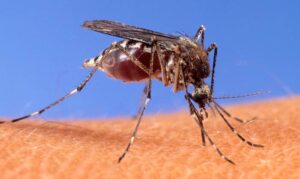
Researchers have discovered a potential link between the tuberculosis BCG vaccine and a reduced risk of developing dementia, sparking new hope in the fight against Alzheimer’s disease. This breakthrough comes as more than 6 million Americans currently live with Alzheimer’s, a number expected to rise as the population ages.
A recent study conducted by McGovern Medical School at UTHealth Houston has revealed that receiving certain adult vaccines may significantly lower the risk of developing Alzheimer’s disease. Published in the Journal of Alzheimer’s Disease, the research sheds light on the relationship between vaccines and brain health, offering promising new avenues for prevention.
Vaccines Linked to Lower Alzheimer’s Risk
Led by researchers Kristofer Harris and Yaobin Ling, with senior author Paul E. Schulz, MD, the study builds on previous findings. Schulz’s earlier research indicated that individuals vaccinated against influenza were 40% less likely to develop Alzheimer’s compared to those who were unvaccinated.
In this latest study, researchers monitored adults aged 65 or older without dementia over an eight-year period. The analysis compared vaccinated and unvaccinated individuals, focusing on vaccines such as Tdap/Td, shingles (HZ), and pneumococcal immunizations. The results were clear: individuals vaccinated with Tdap/Td had a 30% lower risk of developing Alzheimer’s. Similarly, shingles and pneumococcal vaccines reduced the risk by 25% and 27%, respectively.
How Vaccines May Protect the Brain
Scientists propose several mechanisms to explain this protective effect. Vaccines might reduce overall inflammation in the body or enhance the immune system’s ability to fight infections that could otherwise accelerate cognitive decline. Paul E. Schulz explained, “We and others hypothesize that the immune system is responsible for causing brain cell dysfunction in Alzheimer’s. The findings suggest to us that vaccination is having a more general effect on the immune system that is reducing the risk for developing Alzheimer’s.”
Expanding on this, Avram Bukhbinder, MD, co-author of the study, suggested that vaccines might alter how the immune system reacts to the buildup of harmful proteins in the brain, a hallmark of Alzheimer’s. “Vaccines may change how the immune system responds to the build-up of toxic proteins that contribute to Alzheimer’s disease, such as by enhancing the efficiency of immune cells at clearing the toxic proteins,” he said.
Importance of Vaccination Data
The study utilized advanced analytical tools and large-scale healthcare data to ensure robust and reliable results. Yaobin Ling emphasized the significance of this approach, stating, “It’s particularly encouraging to observe consistent results across numerous large-scale healthcare databases.”
Xiaoqian Jiang, PhD, another key researcher from McWilliams School of Biomedical Informatics, highlighted the role of these extensive data sets, noting they “gained valuable insights into which vaccines may protect against Alzheimer’s.”
Existing therapies involving anti-amyloid antibodies slow Alzheimer’s progression by about 25% to 35%. This vaccine-based prevention strategy, offering similar or even greater risk reduction, highlights a powerful and accessible alternative.
Understanding Tdap and Td Vaccines
The Tdap vaccine protects against tetanus, diphtheria, and pertussis (whooping cough). Tetanus bacteria live in soil and dust, entering the body through cuts to cause muscle stiffness and spasms. Diphtheria, a bacterial respiratory disease, leads to severe breathing problems and heart issues. Pertussis is highly contagious, causing severe coughing fits, especially dangerous for infants.
Td is a booster vaccine for adults that protects against tetanus and diphtheria. Health authorities recommend Tdap for adolescents around age 11 or 12, and it’s essential for adults, especially pregnant women, during each pregnancy. Td booster shots are necessary every 10 years to maintain immunity or after severe injuries if your last dose was more than five years ago.
Kristofer Harris emphasized the broader public health significance of their findings. “Our findings are a win for both Alzheimer’s disease prevention research and for public health in general, as this is one more study demonstrating the value of vaccination,” Harris said.
A Promising Path Forward
This new study strengthens the argument for routine adult vaccinations beyond traditional disease prevention. Alzheimer’s disease remains incurable, but preventing it through accessible healthcare measures like vaccination provides hope. Continued research might clarify exactly how vaccines achieve this protective effect, potentially leading to new preventive strategies.
Future studies will explore additional details of the immune system’s role in Alzheimer’s. For now, healthcare professionals urge adults to keep current with recommended vaccinations, emphasizing these routine shots as vital tools in maintaining cognitive health.
Alongside Harris, Ling, and Schulz, this research included efforts by Kamal Phelps, MD; Gabriela Cruz; Jenna Thomas; Luyao Chen, MS; Yejin Kim, PhD; and Xiaoqian Jiang, PhD. This groundbreaking study adds an exciting chapter to Alzheimer’s prevention efforts, reinforcing the critical role of vaccinations for maintaining brain health as you age.





